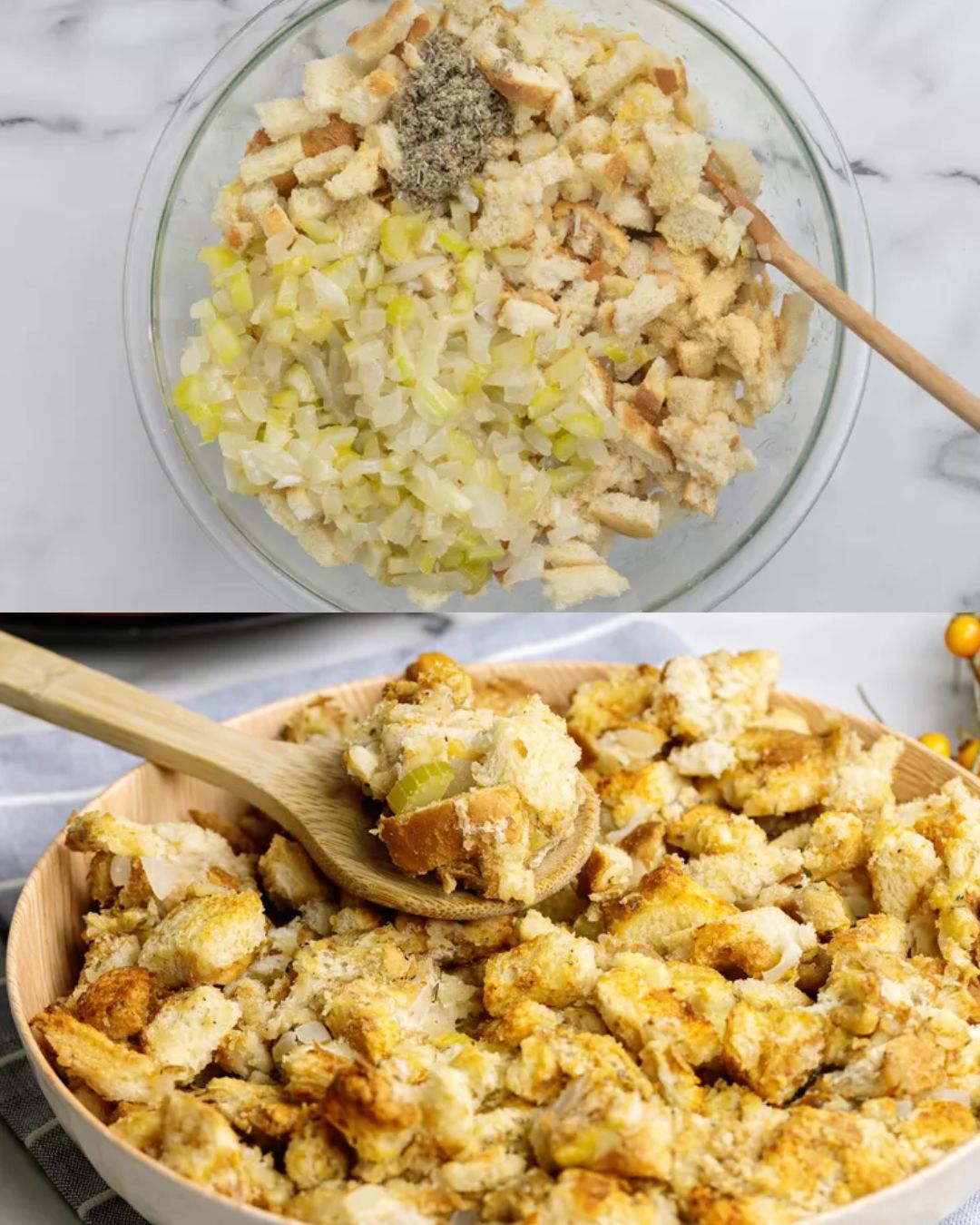Ingredients
- 30 slices white bread, lightly toasted
- 2 tablespoons butter
- 1 large onion, finely chopped
- 2 stalks celery, finely chopped
- 2 cups chicken broth
- 2 large eggs, lightly beaten
- 2 tablespoons water (optional, depending on moisture)
- 2 teaspoons rubbed sage
- 1 teaspoon garlic powder
- Salt and ground black pepper to taste
Preparation Steps
Step 1: Toast the Bread
- Preheat your oven to 350°F (175°C).
- Lay out the 30 slices of white bread on a baking sheet in a single layer.
- Toast the bread in the oven for about 10 minutes, or until golden brown and crispy. You can also use a toaster to toast the bread slices individually if you prefer.
- Once toasted, remove the bread from the oven or toaster and allow it to cool. Once it’s cool enough to handle, cut the bread into cubes or tear it into small chunks. Set aside.
Step 2: Prepare the Aromatic Vegetables
- Melt the butter: In a large skillet or frying pan, melt the 2 tablespoons of butter over medium heat.
- Sauté the vegetables: Add the finely chopped onion and celery to the pan. Stir occasionally and cook for about 5-7 minutes, or until the vegetables are soft and translucent. The aroma of the sautéed vegetables will start to fill your kitchen, signaling that the flavors are coming together beautifully.
Step 3: Combine the Ingredients
- Prepare the bread mixture: In a large mixing bowl, combine the toasted bread cubes with the sautéed onion and celery mixture. The bread should be crisp enough to absorb the flavors but still have some texture.
- Add the seasonings: Sprinkle in the rubbed sage, garlic powder, salt, and black pepper. These spices will infuse the bread with classic stuffing flavors, creating the savory profile that makes this dish so delicious. Mix gently to evenly distribute the seasonings throughout the bread and vegetables.
- Add the liquid: Pour in the 2 cups of chicken broth, which will help moisten the bread, and stir the mixture well to ensure all of the bread cubes have absorbed the liquid. If you prefer your stuffing to be a little moister, you can add up to 2 tablespoons of water, but be careful not to add too much liquid, as the bread should still maintain some structure.
- Add the eggs: Lastly, pour the lightly beaten eggs into the mixture. The eggs will bind everything together and help form a cohesive stuffing once it’s baked. Stir well until the mixture is evenly combined, and you no longer see any pockets of dry bread.
Step 4: Bake the Stuffing
- Prepare the baking dish: Transfer the stuffing mixture into a greased 9×13-inch baking dish. Spread the mixture evenly across the dish, pressing it gently to ensure the stuffing is compact but not too dense.
- Bake: Place the baking dish in the preheated oven and bake for 30-40 minutes, or until the top is golden brown and crispy. The stuffing should be hot and slightly crisped on the edges. If you prefer a softer stuffing, you can cover it with foil for the first 20 minutes of baking to retain more moisture.
Step 5: Serve and Enjoy
Once the stuffing is done baking, remove it from the oven and let it cool for a few minutes before serving. This stuffing pairs beautifully with roast turkey, chicken, or pork, and it’s an essential side dish for any holiday meal.
Prep Time:
Cooking Time:
Total Time:
Servings:
Calories (Per Serving):
- Approximately 180-220 kcal (calories may vary based on the amount of butter and broth used)
Why This Recipe Is Timeless
This stuffing recipe is truly a classic, cherished in kitchens across generations. The simplicity of the ingredients is part of what makes it so timeless. Every ingredient used in this recipe has its own important role in contributing to the dish’s overall flavor and texture.
The white bread, toasted until crispy, provides the perfect texture to absorb the chicken broth and seasonings without becoming soggy. The addition of sautéed onions and celery gives the stuffing its classic savory base, with the buttery aroma of the vegetables adding richness to every bite. The sage and garlic powder infuse the stuffing with a cozy, aromatic essence that has come to define traditional stuffing recipes. The eggs help hold everything together, ensuring that the stuffing has a pleasing, cohesive texture once baked. Finally, the chicken broth provides the necessary moisture, bringing all the ingredients together into a deliciously flavorful side dish.
One of the reasons this stuffing recipe has endured for so long is its versatility. You can make it in advance, refrigerating it until it’s time to bake, and it will still taste just as great. You can also customize the recipe to suit your tastes, whether by adding sausage, nuts, or dried fruit, or by using different seasonings. The foundation of toasted bread, vegetables, and seasoning remains constant, while the variations you choose only make the dish more exciting.
Moreover, stuffing is a dish that pairs with so many different kinds of meals, from simple weeknight dinners to grand holiday feasts. It’s easy to prepare, comforting to eat, and always a crowd-pleaser.
Nutrition Facts (Per Serving)
- Calories: 180-220 kcal
- Fat: 8g
- Carbohydrates: 25g
- Fiber: 2g
- Sugar: 3g
- Protein: 5g
- Sodium: 350mg
- Cholesterol: 35mg
FAQs
1. Can I make this stuffing recipe ahead of time? Yes, this stuffing can easily be made ahead of time. After preparing the stuffing, transfer it to a baking dish, cover it with plastic wrap or foil, and refrigerate it for up to 1-2 days before baking. When you’re ready to bake, allow it to sit at room temperature for about 30 minutes before placing it in the oven.
2. Can I use other types of bread in this recipe? Absolutely! While this recipe uses white bread, you can substitute it with other types of bread like whole wheat, sourdough, or even cornbread for a unique twist. Just make sure the bread is toasted well enough to hold up in the stuffing mixture.
3. Can I make this stuffing gluten-free? Yes! You can easily make this stuffing gluten-free by using gluten-free bread and ensuring that your chicken broth is gluten-free as well.
4. Can I add meat to this stuffing? Yes, you can enhance this stuffing by adding cooked sausage, bacon, or even ground turkey to the mixture. Just sauté the meat with the onions and celery for added flavor.
Tips for Making the Best Stuffing
- Toast the bread well: Make sure the bread is toasted until golden brown to prevent it from becoming mushy once it absorbs the broth.
- Customize the seasoning: If you like other herbs, feel free to add thyme, rosemary, or parsley to the stuffing. These herbs complement the sage and garlic powder beautifully.
- Don’t over-moisten: While the chicken broth is key to moistening the bread, be careful not to add too much liquid. The bread should be moist but not soggy, so adjust the amount of broth as needed.
- Use homemade broth for extra flavor: If possible, use homemade chicken broth to give your stuffing a deeper, richer flavor.
Storage Tips
- Refrigeration: Leftover stuffing should be stored in an airtight container in the refrigerator. It will last for 3-4 days.
- Freezing: You can freeze this stuffing for up to 3 months. Just be sure to wrap it tightly in plastic wrap and foil to prevent freezer burn. To reheat, simply thaw it overnight in the refrigerator and bake at 350°F (175°C) until hot.
Conclusion
This classic stuffing recipe is a timeless favorite that has earned its place at every holiday table and family gathering. Simple yet flavorful, it combines toasted bread, savory vegetables, and aromatic spices to create a dish that’s both comforting and satisfying. With its versatility and ease of preparation, this stuffing recipe is sure to become a staple in your kitchen for years to come. Whether you’re serving it with turkey, chicken, or roast pork, this stuffing will always be the perfect accompaniment to any meal, making it a dish that never goes out of style. Enjoy it with loved ones and make cherished memories around the dinner table!

